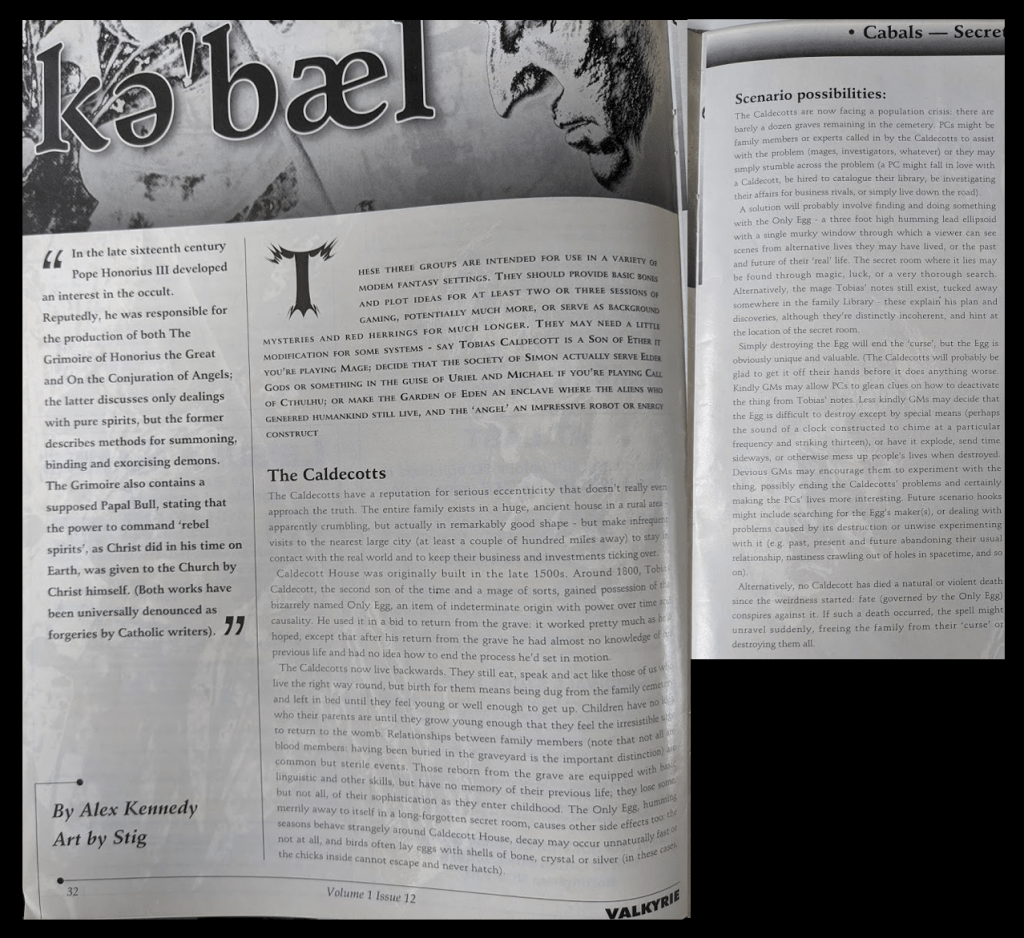
/kəˈbal/, Part 3: The Society of Simon
The following is an extract from an article Alexis wrote decades ago, in 1996, for British roleplaying magazine Valkyrie. It’s juvenilia, and some bits make him wince – but it’s an insight into his early style and fiction which later became Fallen London, Sunless Sea and Cultist Simulator. [ Part 1, Part 2 ]
All details about the Jesuits are supposed true, and there really were such rumours about Pope Honorius. But the Society of Simon is, sadly, fictional.
“Perhaps the most frankly diaboloical of the Rituals connected with Black Magic.”
A. E. Waite, on The Grimoire of Honorius the Great
The Society of Simon
The Society of Simon is one of the Catholic Church’s most carfeully kept secrets. It was originally an offshoot of the Society of Jesus – the ‘Jesuits’ – who were established in the sixteenth century to combat the Reformation and suchlike ungodliness. The Jesuits later became notorious for the secular power they gained; their canny methods of education, indoctrination and interrogation, the strength of their organisation and their secrecy earned them the suspicion and enmity of many European governments, until they were formally suppressed by Pope Clement XIV in 1773. They were, however, reconsituted by Pius VII in 1814 and today, as far as anyone knows, are a harmless institution who perform much charitable and missionary work. The Society of Simon, however, never achieved such public prominence.
In the late sixteenth century Pope Honorius III developed an interest in the occult. Reputedly, he was responsible for the production of both The Grimoire of Honorius the Great and On the Conjuration of Angels; the latter discusses only dealings with pure spirits, but the former describes methods for summoning, binding and exoricising demons. The Grimoire also contains a supposed Papal Bull, stating that the power to command ‘rebel spirits’, as Christ did in his time on Earth, was given to the Church by Christ himself. (Both works have been universally denounced as forgeries by Catholic writers.) There remained, however, a long history of bad blood between the Church and the practitioners of the secret arts. Honorius desperately wanted access to magicians – for purposes of scholarship – to increase his own power, and because he genuinely believed it to be God’s will that the Church practice magic; but the more powerful and knowledgeable the magicians, the less they had to gain by corresponding with him.
To this end, he established the Society of Simon (modelled after Simon Magus, the magician who was cast down and humbled by the apostles, and – according to certain sources later – turned to Christianity for pragmatic reasons). He recruited them from the members of the Society of Jesus, reasoning that their tradition of secrecy and notorious skill with logic would suit his ideals. He suspected that after his death the Church would turn against magic again; the Society was intended to ensure that the Church was never left entirely without magical assistance. The Society did indeed survive his death and the purge that came after, and have spent the last four hundred years building on and expanding from the lamentably small body of lore with which Honorius gifted them. They have – to some degree – the friendship and patronage of the Archangels Michael and Uriel. This has allowed them to become a respectably powerful Hermetic order. There are now fifty of them in all. They retain very tenuous and careful links with the upper echelons of the Society of Jesus, and may have been responsible for the Jesuits’ reconstitution.
The Society of Simon have an unusually informal hierarchy, by the standards of both ecclesiastic and magical orders. This is mostly due to their strong tradition of secrecy and independence, and the ‘us vs. them’ mentality that prevails – the Society has no natural allies. However, absolute loyalty to the Honorian Council – the five members who govern the rest – is expected. The policy and attitudes of the Society vary according to who’s currently sitting on the Council but they tend to be cautious and conservative. Their loosely stated goals are to preserve the power of the Church and keep things supernatural generally in check. Nearly all members of the Society are fully ordained priests, some very highly placed in the hierarchy of the Church. And, of course, all are committed Christians. They generally stop short of murder, but will go to extreme and unethical lengths to retain their anonymity.
Their first loyalty remains to the Church and its doctrine – at least, what they perceive that doctrine to be. When each new Pope is elected, a member of the Society – at least one cardinal is always a Simonite – formally reveals the existence of the Society to him and offers their assistance. If he refuses, magics are used to remove the memory of the event. If he accepts, their loyalty to him is complete – enforced, some say, by binding-magics Honorius concealed in the lore he gave to them. There are rumours, among those who know of or suspect the Society’s existence – including the other magical societies with which they have had cautious commerce over the years – that the Simonites sometimes stoop to influence the choice of the next Pope.
Fortunately, there has not been a Pope, since the Society’s creation, who is both an extremist and willing to work with magicians. If one such Pope were elected, and chose to use the Simonites for his own ends, the result could be anything between a conspiracy theorist’s wet dream and a full-fledged secret war with ungodly magicians.
Scenario possibilities
The obvious use for the Society is a conspiracy for PCs to investigate – they have the whiff of authenticity that makes for good conspiracy theories. The PCs will most likely run into them when both are investigating a third party. One of the best and easiest way to thicken a plot and sow entertaining confusion is to have more than one secret group involved, with different but related motives; players will almost invariably assume that they’re the sane group unless presented with overwhelming evidence to the contrary. The Society is perfect for such a technique, especially since many modern fantasy campaigns centre around the PCs stomping on various forms of supernatural nastiness, and the Society may agree with their motives but not their methods, aiding them with information while keeping them under surveillance and trying to frighten them away from some situations. For even more fun, have two members of the Society working at crosspurposes with each other, knowingly or unknowingly.
Alternatively, the PCs might be Society of Simon members, either full-fledged mages or exorcist footsoldiers and expendable novices. This could be run as anything from CoC with an unusual twist to Ghostbusters meets The Pope Must Die.



Amazing content! We need more of this